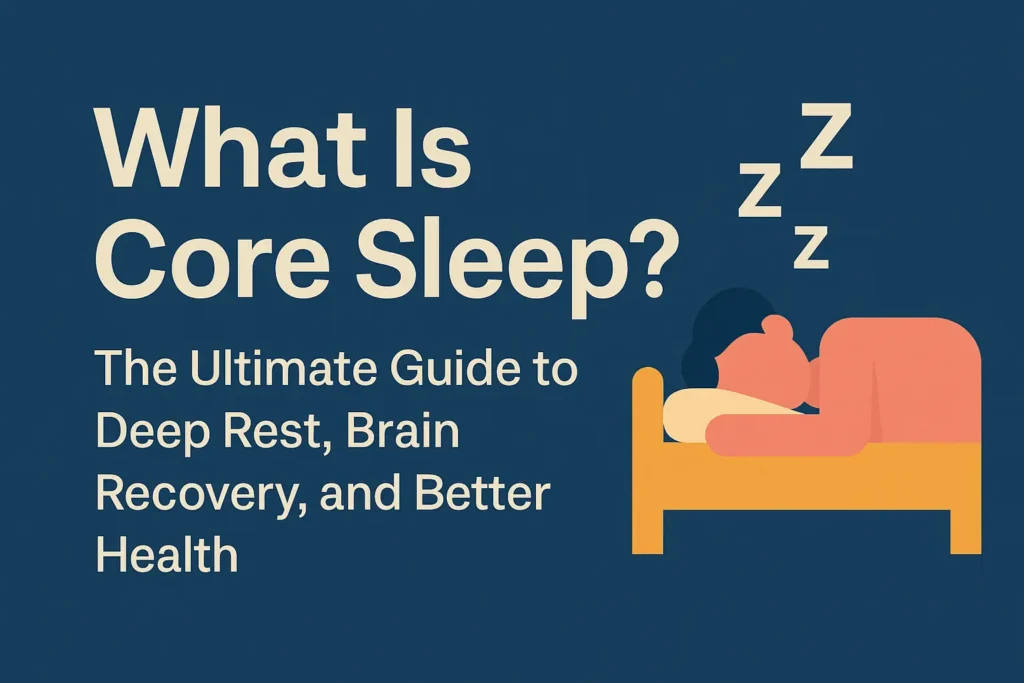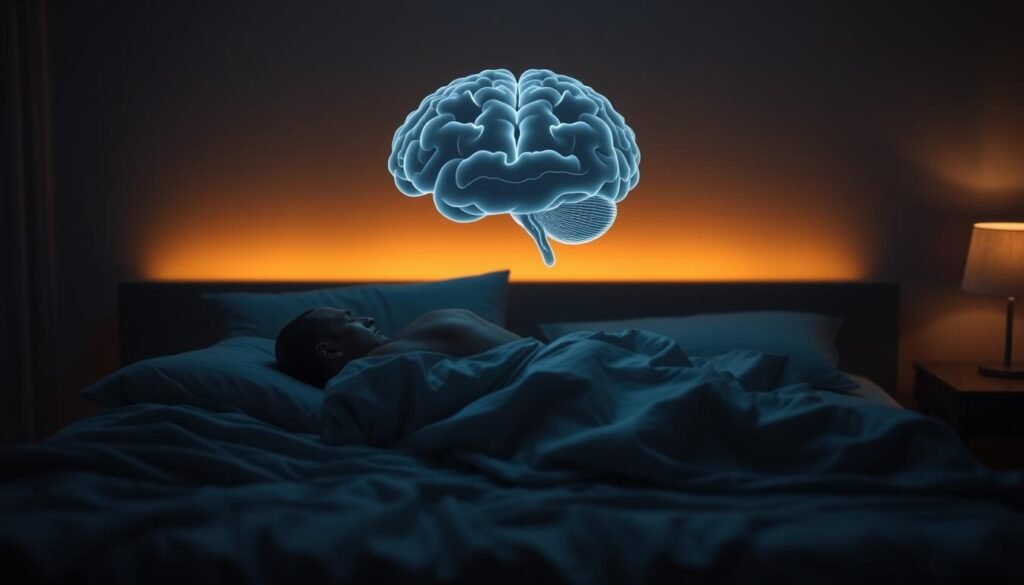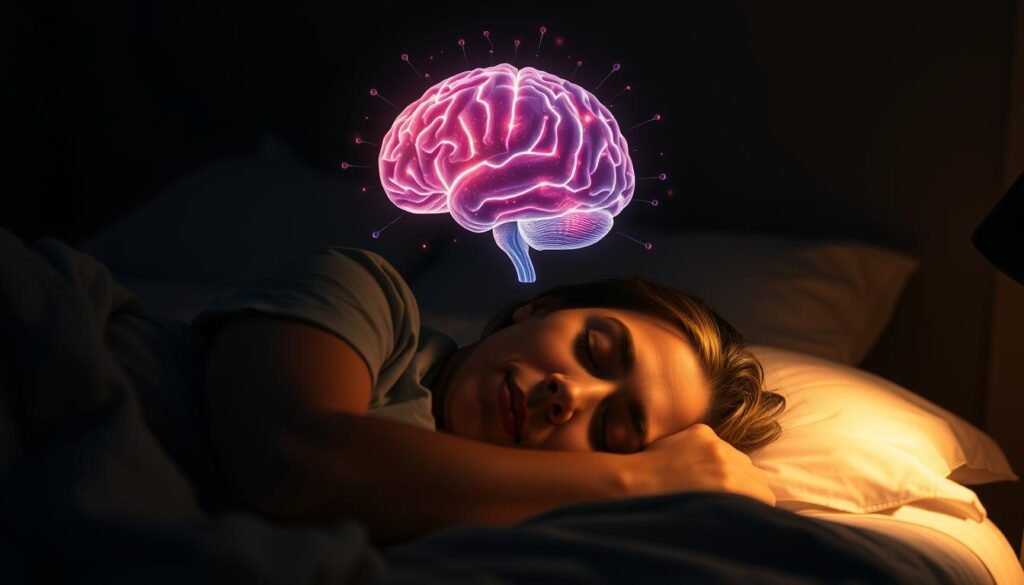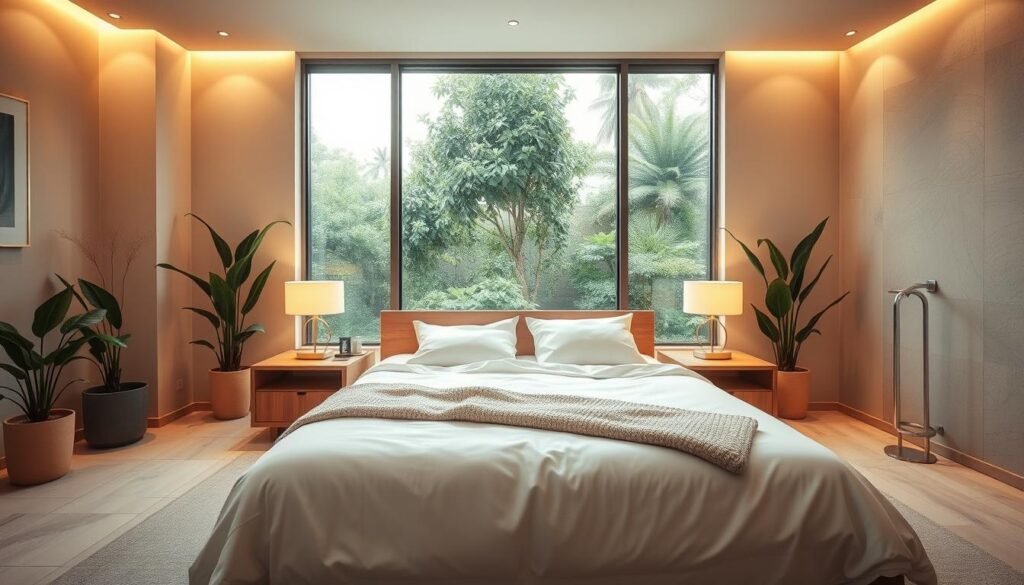You spend about a third of your life sleeping. Yet, many of you may not get the quality rest you need. Did you know that a significant portion of adults experience poor sleep quality? This can hurt your health and daily life.
What is core sleep, and why does it matter? Core sleep includes deep sleep and REM sleep—two essential stages for fixing your body, balancing emotions, and keeping your mind sharp. It’s when your body repairs tissues, strengthens memory, and regulates vital hormones. Understanding what core sleep is can be a game-changer for your health and well-being.
Improving your sleep hygiene and aligning with your natural circadian rhythm can help a lot. This guide will dive into the science of restorative sleep, explore its benefits, and share proven tips to help you sleep better and feel your best.
.

Understanding Core Sleep: Definition and Importance
Core sleep is key to our nightly rest. It helps our bodies and minds heal. It includes deep sleep and REM sleep, which are vital for recovery and memory.
Definition and Importance of Core Sleep
Core sleep is the deep sleep needed for healing. It helps our bodies fix tissues and strengthen our immune system. It also helps our brains remember and feel emotions.
| Stage | Description | Importance |
|---|---|---|
| NREM Stage 3 | Deep sleep stage characterized by slow delta waves | Physical restoration, tissue repair |
| REM Sleep | Stage characterized by rapid eye movements and vivid dreams | Memory consolidation, emotional regulation |
How Core Sleep Differs from Regular Sleep
Regular sleep is the whole sleep pattern. Core sleep focuses on the restorative stages. Knowing the difference helps us focus on better sleep.
The Role of Core Sleep in Overall Sleep Architecture
Core sleep is the base of good sleep. It’s the foundation for other sleep stages. Getting quality core sleep is key for a healthy sleep pattern.
Understanding core sleep helps us improve our sleep. We can make our sleep better by creating a good sleep space and keeping a regular sleep schedule. Avoiding sleep disruptors is also important.
The Science Behind Sleep Cycles and Stages
The Science Behind Sleep Cycles and Stages
Learning about sleep is key to knowing its health benefits. A full night’s sleep includes many stages. Each stage is important for our body and mind to heal.
The Complete Sleep Cycle Explained
A full sleep cycle lasts 90-120 minutes. It has three NREM stages and one REM stage. Each cycle gets a bit longer as the night goes on.
NREM vs. REM Sleep
NREM sleep lowers body temperature and heart rate. It has three stages, with Stage 3 being the deepest. Here, waking up is hard because brain waves slow down.
REM sleep is different. It has fast eye movements, more brain activity, and vivid dreams. It’s key for memory and emotions.
The Critical Importance of Deep Sleep Phases
Deep sleep, or Stage 3 NREM, is vital for healing. It helps repair tissues, build bones and muscles, and boost the immune system. It’s also when memories are processed and stored.
To get better sleep, knowing about sleep cycles and stages is crucial. Focus on deep sleep to improve health and well-being. A regular sleep schedule and a good sleep environment also help.
Here are some key benefits of deep sleep:
- Physical Restoration: Tissue repair and regeneration
- Cognitive Function: Memory consolidation and emotional regulation
- Immune System Strengthening: Enhanced immune function
- Overall Well-being: Improved health and quality of life
By understanding and focusing on sleep cycles and stages, you can improve your sleep and health.
Core Sleep vs. Other Sleep Types

Exploring sleep, we find core sleep is key. It’s a big part of our sleep and can change with different patterns and schedules.
There are many sleep patterns like monophasic, polyphasic, and segmented. Each has its own way to get core sleep. How we sleep has changed over time and varies by culture.
Monophasic, Polyphasic, and Segmented Sleep Patterns
Monophasic sleep is one long sleep at night, common today. Polyphasic sleep has many short sleeps in a day. Segmented sleep breaks sleep into parts with wake times in between.
- Monophasic sleep fits the 9-to-5 work schedule well.
- Polyphasic sleep needs big lifestyle changes.
- Segmented sleep was once common, with night wake-ups.
Core Sleep in Different Sleep Schedules
Quality core sleep is vital, no matter the pattern. In monophasic, core sleep happens at night. For polyphasic, one sleep period must have deep sleep.
Segmented sleep also allows core sleep in deep sleep stages. The sleep periods must be long enough for deep sleep.
Cultural and Historical Perspectives on Sleep Patterns
Sleep patterns have changed over time and vary by culture. Some cultures used biphasic or segmented sleep with a wakeful period. This time was for reading, meditation, or socializing.
Learning from history and other cultures helps us improve our sleep. We can find better ways to sleep by understanding the past and different cultures.
The Biological Benefits of Quality Core Sleep
Quality core sleep has many benefits. It helps your brain recover and your hormones stay balanced. It also boosts your overall health.
Brain Recovery and Neuroplasticity
Core sleep is key for brain recovery and neuroplasticity. It helps your brain remember things and get rid of waste. This is important for learning and keeping your mind sharp.
- Enhances memory consolidation
- Supports neural adaptation and recovery
- Promotes neuroplasticity for better learning
Hormone Regulation and Production
Good core sleep is vital for hormone regulation and production. During deep sleep, hormones like growth hormone and insulin are released. This keeps your body growing and working right.
This hormone balance affects your health and how you feel. For example, growth hormone helps fix and grow tissues during sleep.
Cellular Repair and Immune Function
Core sleep is crucial for cellular repair and immune function. It helps fix damaged cells and build strong bones and muscles. This keeps you healthy and fights off sickness.
- Repairs and regenerates damaged cells
- Boosts immune function
- Supports overall physical health
Metabolic Health and Weight Management
Metabolic health and weight management also benefit from core sleep. Good sleep helps control hunger hormones and improve how you use sugar. This is key for staying at a healthy weight.
By focusing on core sleep, you can improve your health and manage your weight better. Quality core sleep is not just rest. It actively helps you stay healthy and full of energy.
How Core Sleep Impacts Cognitive Function and Mental Health

Learning about core sleep’s effects on your mind and mood can change your life. Core sleep is key to your brain’s health and how well you think. It plays a big role in many brain functions.
Memory Consolidation During Deep Sleep
Core sleep, especially deep sleep, helps your brain keep memories. It moves info from short-term to long-term memory. This makes it easier to remember and learn new things.
Memory consolidation is vital for learning new skills and remembering new info. Lack of sleep can hurt your memory and brain work.
Problem-Solving and Creativity Enhancement
Core sleep also boosts your problem-solving and creativity. Your brain works on info during sleep, leading to new ideas when you wake up.
A study showed people with enough core sleep solved complex problems better than those who didn’t sleep well.
Emotional Regulation and Stress Management
Core sleep also helps with emotional control and stress. Good deep sleep helps manage stress and lowers emotional disorder risks.
Sleep experts say, “Sleep is key for emotional control, and sleep issues can make you more emotional and stressed.”
Sleep Quality and Mental Health Disorders
Good core sleep is linked to mental health. Bad sleep can lead to depression and anxiety.
Improving core sleep can help manage these mental health issues. It’s important to make sleep a big part of your mental health plan.
By working on better core sleep, you can greatly improve your thinking and mood. It’s a big step towards a healthier life.
Optimizing Your Sleep Environment for Better Core Sleep

To get better sleep, make your bedroom a place for deep rest. It should be calm and free from distractions. This way, you can sleep more soundly.
Creating the Ideal Sleep Sanctuary
Make your bedroom dark, quiet, and cool. Use blackout curtains, earplugs, or a white noise machine. A tidy and peaceful room helps you sleep better.
Choosing the Right Mattress and Pillows
Choosing the right mattress and pillows is key. A mattress that’s too soft or too firm can hurt your sleep. Pillows should keep your neck straight and your spine aligned.
Tech Solutions for Sleep Environment Optimization
Technology can also help your sleep. Smart thermostats keep the room at the right temperature. White noise machines or apps can block out noise. Sleep trackers and smart light bulbs can also make your room better for sleep.
Lifestyle Habits That Enhance Core Sleep Quality

Healthy habits can make you sleep better and wake up feeling great. Going to bed and waking up at the same time every day is key. This helps your body’s clock stay in sync, leading to better sleep.
Establishing a Consistent Sleep Schedule
A regular sleep schedule helps your body get into a rhythm. It makes falling asleep and staying asleep easier. It also helps your body’s health processes work better.
Pre-Sleep Routines That Work
A calming routine before bed tells your body it’s time to sleep. Try reading, taking a warm bath, or meditating. These activities can make your sleep better and improve your health.
Nutrition and Exercise for Better Sleep
Eating right and exercising can also help you sleep better. Avoid big meals before bed and stay active. Also, watch how much caffeine and alcohol you drink.
Managing Screen Time and Blue Light Exposure
It’s important to limit screen time and blue light. Blue light from screens can mess with your sleep hormone. Use blue light filters or apps to help you sleep better.
Tracking and Measuring Your Core Sleep
To get better rest, it’s key to track and measure your core sleep well. This way, you can learn a lot about your sleep habits. You can also find out where you might need to make some changes.
Modern Sleep Tracking Technologies
New tech has brought many sleep tracking tools and apps. These tools help track your sleep patterns, showing how long you sleep, what stages you go through, and how well you sleep. Smartwatches and fitness trackers often have sleep tracking features. They use data from your movements to see when you’re sleeping.
Some top sleep tracking tools include:
- Wearable devices (smartwatches, fitness trackers)
- Sleep apps (mobile apps that track sleep)
- Bedside monitors (devices that track sleep without touching you)
These tools make it easy to keep an eye on your sleep over time. They help you understand your core sleep better.
Understanding Sleep Metrics and Data
When you start tracking your sleep, it’s important to know what your data means. Common sleep metrics are how long you sleep, how well you sleep, and how much time you spend in different sleep stages.
Looking at these metrics can help you:
- See patterns and trends in your sleep
- Check how good your sleep is
- Make smart choices to improve your sleep
By knowing your sleep metrics, you can take steps to make your core sleep better.
Professional Sleep Studies and When to Consider Them
While personal sleep tracking devices are helpful, sometimes you need a professional sleep study. If you keep having sleep problems or think you might have a sleep disorder, see a doctor.
A professional sleep study, or polysomnography, gives a detailed look at your sleep. It’s great for finding sleep disorders like sleep apnea, insomnia, or restless leg syndrome.
If you’re thinking about a professional sleep study, find a good sleep center or clinic. Look for places with experienced professionals who can help you through it.
Common Sleep Disorders Affecting Core Sleep
Core sleep is key for our health. But, many sleep disorders can harm its quality. Knowing about these disorders is the first step to fixing them.
Insomnia and Its Impact on Deep Sleep
Insomnia makes it hard to fall or stay asleep. It badly affects core sleep quality. People with insomnia get less deep sleep, leading to tiredness and poor thinking.
Sleep Apnea and Breathing-Related Disorders
Sleep apnea stops and starts breathing while sleeping. It messes up core sleep. This can make sleep broken and reduce brain oxygen, harming health and raising heart disease risk.
Parasomnias and Movement Disorders
Parasomnias like sleepwalking and night terrors, and movement disorders like restless leg syndrome, hurt core sleep. They cause broken sleep patterns and lower sleep quality.
When to Seek Professional Help
If sleep problems keep you awake, make you tired during the day, or cause other symptoms, get help. A doctor can find the cause and suggest the right treatment.
Conclusion: Embracing the Power of Core Sleep for Optimal Health
You now know how important core sleep is for your health. It helps your body, mind, and emotions feel better. It’s key for your brain, hormones, and immune system to work right.
To get the most from core sleep, live a healthy lifestyle. Stick to a regular sleep schedule and make your bedroom sleep-friendly. Also, avoid sleep problems. This way, you’ll sleep better and feel great when you wake up.
Remember, core sleep is a big part of being healthy. By focusing on it, you’ll enjoy many benefits. This leads to a happier, healthier you.
FAQ
What is core sleep, and why is it important?
Core sleep is deep sleep and REM sleep. These stages help your body heal, remember things, and feel balanced. It’s key for staying healthy.
What does core sleep mean in simple terms?
Core sleep refers to the essential stages of deep and REM sleep that your body needs for recovery and mental clarity.
Is core sleep differ from regular sleep?
Core sleep is the most restorative part of sleep. It includes deep and REM sleep. Regular sleep can be different, not always enough core sleep.
What are the benefits of prioritizing core sleep?
Focusing on core sleep improves healing, balance, and thinking. It helps your brain, hormones, and immune system. This leads to better health and happiness.
How can I optimize my sleep environment for better core sleep?
Make your sleep area dark, quiet, and cool. Pick the right mattress and pillows. Use white noise machines or sleep trackers to improve sleep.
What lifestyle habits can enhance core sleep quality?
Stick to a sleep schedule and relax before bed. Eat right and exercise well. Avoid screens and blue light before sleep.
How can I track and measure my core sleep?
Use devices like Fitbit or Oura Ring to track sleep. They show how well you sleep. This helps find ways to sleep better.
What are some common sleep disorders that can affect core sleep?
Disorders like insomnia, sleep apnea, and movement disorders can harm core sleep. If you can’t sleep well, see a doctor.
How does core sleep impact cognitive function and mental health?
Core sleep helps with memory, solving problems, and being creative. It also helps manage emotions and stress. This lowers the chance of mental health issues.
Can different sleep patterns, such as polyphasic or segmented sleep, impact core sleep quality?
Yes, different sleep patterns can change core sleep quality. Knowing about these patterns can help improve sleep.
What is the role of circadian rhythm in core sleep?
Your circadian rhythm controls when you sleep and wake. It affects core sleep quality. A regular sleep schedule helps keep your rhythm healthy.

